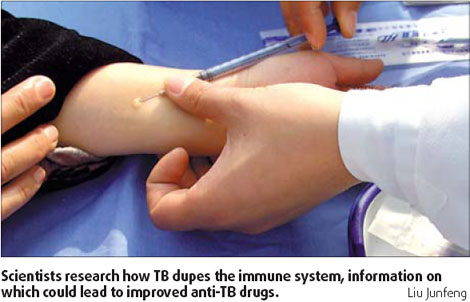
Scientists have figured out how tuberculosis tricks the immune system, a discovery that could lead to new anti-TB drugs, according to a newly-released study.
In experiments with mice, they identified a key mechanism whereby TB bacteria provoke a form of death in host cells that enables the infection to spread through the lungs, they reported.
Tuberculosis infects more than nine million people every year, and in 2006 claimed nearly 1.7 million lives, World Health Organization figures show.
Researchers have long known that virulent mycobacterium tuberculosis disables the body's immune system by attacking specialized immune cells in the lungs called macrophages, turning them into slave "incubators" where the invading bacteria multiply.
Heinz Remold of the Brigham and Women's Hospital in Boston, Massachusetts, and colleagues set out to understand exactly how.
Normally, infected macrophages undergo a form of cell death - known as apoptosis - that keeps their membranes intact, thus preventing any entrapped bacteria from spreading. This process triggers the release of another type of immune cell that disposes of the infected cell corpses by devouring them.
That is exactly what happens with more benign strains of TB, making them harmless.
But in experiments with cultured bacteria and in mice using a more virulent strain, known as H37Rv, Remold's team observed a different chain of events.
This more potent strain suppressed the apoptosis response and instead induced a different kind of cell death, called necrosis.
"Necrosis is detrimental to host defence against tuberculosis," Remold says in the study, published online in the London-based journal Nature Immunology.
"It releases viable intracellular bacilli for spreading infection and promotes tissue damage typical of advanced tuberculosis."
The new research pinpoints for the first time the biochemical process than leads to the formation of the protective pouch in apoptosis that is disabled by the TB bacterium, providing a new target for possible drug therapies.
Drugs that cure tuberculosis have been available for decades, but in poorer countries TB continues to ravage.
Drug-resistant strains that emerged in the 1990s are threatening what had once seemed the readily attainable UN Millennium Goal of halting, by 2015, an increase in the number of new cases every year.
(China Daily September 17, 2008)